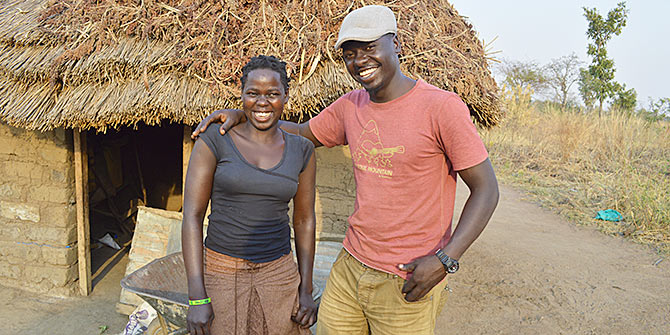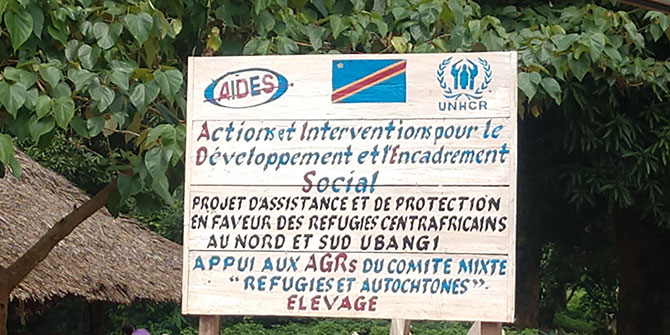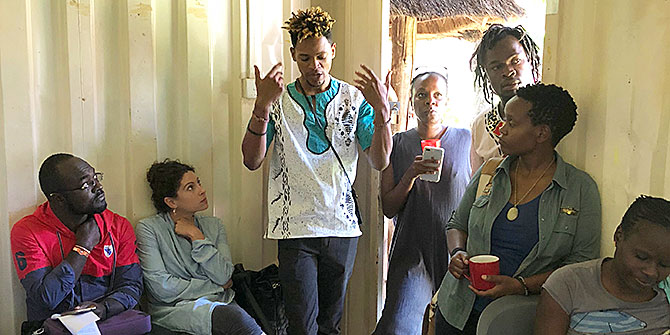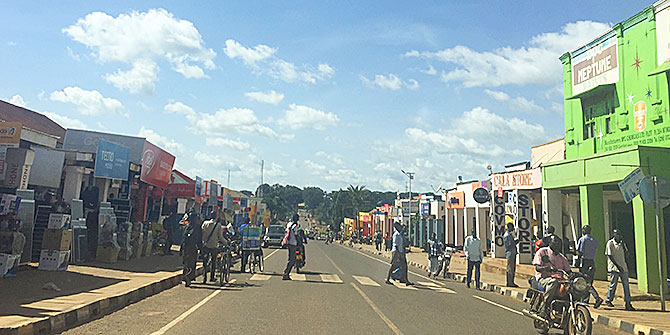Madeleine Issitt and Aloh Francis find out just how successful football is in developing social harmony in post-conflict areas.
This article is part of our #LSEReturn series, exploring themes around Displacement and Return.
It has been said that football can heal the social wounds of war and be a force for reconciliation. But is that really true? In opposing two teams, there is an inherent contradiction in the idea of bringing people together to support explicit competition between groups. Speaking to promoters of football for social cohesion in post-war northern Uganda, it became clear that the way in which competition between teams is managed is the true determiner of just how unifying – and how polarising – sport can actually be.
Speaking to people in Gulu about what football means to the Acholi people, the dominant response was one of an ‘escape’, a ‘community’ and a way to forget about ‘the bad things that have happened to people’ in the war (Coach Kentos, Gulu Utd FC). However, the stakes become considerably higher when a large sum of money is at stake. Very quickly, interest in the matches can become fuelled more by a dislike for the opposing team than admiration for one’s own. Indeed, tribal racism still runs high and the memories of the atrocities of war are far from being healed. How much then, does football unite and how much does it merely serve to draw thicker lines between already divided groups?
Identity in northern Uganda is a product of a range of factors, and the categories under which people tend to associate themselves are often fluid and overlapping. Since the time of British rule in Uganda, there has been a tendency for politics to be polarised around ethnic categories, usually described as ‘tribes’. These were used as categories for indirect colonial rule, and after independence, became associated with social and political tensions, and often outright violence. This was particularly apparent during the long period of war in northern Uganda from the 1980s.

Image Credit: Akona Geoffrey
In Gulu, northern Uganda, the coach of Winterbury Football Club, Okot Stephen Collins, claims that ‘football gives you another world to live in’. A proud believer in how it can help forge new ‘identities’ for players in his team, we discussed the impact of the latest nationwide football tournament in Uganda, which was the first of its kind this year, since the 1980s. Named the ‘Drum’, and organised by FUFA (Federation of Ugandan Football Associations), it organised matches between 16 provinces in the country, from the group stages in January to the two-leg final that took place on 30 September and 7 October 2018, when Buganda defeated West Nile to win the trophy.
Some of the provinces are constituted of a small number of tribes (West Nile, for example, is home to five different tribes), while others are made up of just one. It was the uniting of these populations, particularly those which were made up of a single tribe (such as Acholi, where our research was carried out), which laid the foundations for the potential for serious tensions.
To build support for teams in the tournament, ethnic identities were mobilised. Some, such as Akena Geoffrey, head coach of Gulu United FC and assistant coach to the Acholi team in the Drum, were confident about the tournament fostering social harmony among the Acholi people. Coming from all corners of Acholi land to Pece War Memorial Stadium, vast numbers of football lovers were brought together to watch the progression of one team. Meanwhile, others point to how the Drum brought together chiefs Rwot Nyacci of Lango and Rwot David Onen Acana II of Acholi, promoting civil relations between the tribes and setting a precedent for peace and unity. There were other incentives too. While claiming to bring ‘the beautiful game to the masses of Uganda’ (FUFA quote), teams competed for a small fortune of 32 million shillings (almost £7000). Runners up (West Nile) were entitled to 15 million shillings (roughly £4000).
But things got out of hand. Teams associated with different tribes, surrounded by crowds of adrenaline-charged fans and being explicitly pitted against one another for a large cash prize spelled disaster. Tensions ran high as crowds started fights, things were thrown at police, and the match between West Nile and Bugisu was called off when fans from the home crowd in Mbale stormed the pitch after a controversial decision by the referee.

Image credit: Akona Geoffrey
Moreover, FUFA had made many promises. Any boy, from any tribe, who had ever dreamed of playing in front of a crowd finally had the opportunity he had been waiting for. Branded as a way to provide ‘raw talent’ in each region with the exposure it deserved, the team sheets told a different story, as it emerged that only first division players had been selected. Once again, grassroots football was being brushed under the carpet in the quest to secure a large sum of money, by playing the most talented footballers available, against ethnically-defined rivals.
Further controversy was sparked among Acholis when the teams were announced. Acholi land is comprised of the districts of Gulu, Amuru, Nwoya, Omoro, Agago, Pader, Kitgum and Lamwo, yet the chosen team contained players from only a couple of districts. Supposedly a condensed representation of the Acholi people, according to this team, most of the population simply ceased to exist. Did FUFA really care about what each team meant to its’ people? People’s faith in the honourability of FUFA’s motivations was beginning to wane.
Murmurings of corruption permeated many of our discussions, as people feared that much of the prize money would never reach the winning District Football Associations, but would instead disappear into the pockets of the most senior figures in football. Speaking to the captain of the Acholi team, it emerged that player’s allowances were used to pay hotel bills when the team were knocked out of the tournament. It is too early to see whether smaller clubs in Buganda reap any of the financial benefits of their winning team. However what is clear is that the generous compensation promised by FUFA have not yet materialised, and maybe never will.
It is easy to take from this the message that football in northern Uganda can be boiled down to a microcosm of corruption, miscommunication and tribal politics. Yet this misses so much. Whatever the machinations of the football elites, the game permeates the lives of most of the population. This perhaps explains why so many people flock to watch Premiership football rather than live local games.

Today in Gulu, ‘screen’ football is more popular than ever. Shouts of “Falcao!” and “Here, Adebayor!” drift across Gulu University football pitch as we watch a high-intensity match unfold. Perhaps there is something to be said for the growth in interest in Premiership football in creating social cohesion. People in Gulu feel passionately about their chosen team, most commonly Manchester United or Arsenal, and share whole-heartedly in the joy of their successes and the pain of their losses. Perhaps some of the appeal of the Premiership is that it remains detached; not posing the same risk of unearthing historical tensions, or sparking serious widespread conflict between large populations.
Looking at the way people talk about football in Gulu, it is clear that the local game has not been enhanced by organising the competition based on ethnic categories. The slogan they chose in the Drum was ‘Celebrating our Ancestry’. Is that ‘ancestry’ really celebrated by reifying tribes into football teams – and prioritising the selection of professional athletes? Most people we spoke to did not think so. Football is not viewed as something tied to ancestry – unless it is the vicarious enjoyment of the history of Manchester United or Arsenal – or perhaps the barefoot Uganda Cranes who played in England in 1956, and beat the GB Olympic team!
Those passionate about actually playing football are primarily concerned with obtaining a football with which to play. And those with football-playing ambitions are concerned with creating futures, not reimagining pasts.
A good example are the flag-bearers of women’s football in Gulu. They have no precedent to celebrate. Their mothers and grandmothers had no access to the sport, forced to be content only with trying to run in billowing skirts on a school netball court. Yet today, there are signs of football beginning to be used to challenge archaic attitudes on gender, women paving a new path, struggling to assert themselves as equals in a very male and patriarchal world.
It is an uphill battle. For now, interest in local football is dwindling, as small-scale matches in Gulu are rearranged to avoid clashes with the Premier League, and young boys emulate the play of men on the other side of the world.
Find out more about the Politics of Return and our Trajectories of Displacement research projects, which are based at the Firoz Lalji Centre for Africa and funded by ESRC/AHRC.
Madeleine Issitt is an undergraduate student at the University of Oxford, studying for a BA in Archaeology and Anthropology.
Aloh Francis (Francis Abonga) has a BA in Business Administration and Finance from Gulu University. He has also worked on a number of research projects since 2012, including two major research projects: the Land Conflict Mapping Tool for the Acholi Sub-Region (UN Peacebuilding Fund/Human Right Focus) and the Joint Acholi Sub-regional Leaders Forum Customary Land survey (Trocaire/Democratic Governance Facility). Francis has also worked as a professional footballer having played his trade in Uganda, Zimbabwe, Nepal and Vietnam.
The views expressed in this post are those of the author and in no way reflect those of the Africa at LSE blog, the Firoz Lalji Centre for Africa or the London School of Economics and Political Science.





